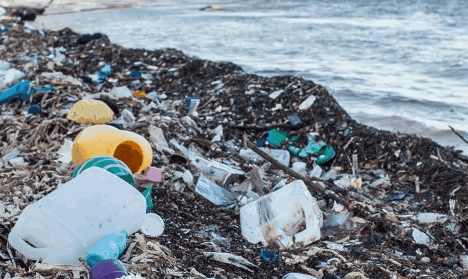Disposal of plastics into sea killing wildlife – EPA
 Mr John Pwamang, Acting Executive Director, of the Environmental Protection Agency (EPA) on Thursday said the disposal of plastics and debris into the ocean was leading to enlargement and death of some marine wildlife through ingestion.
Mr John Pwamang, Acting Executive Director, of the Environmental Protection Agency (EPA) on Thursday said the disposal of plastics and debris into the ocean was leading to enlargement and death of some marine wildlife through ingestion.
He said human activities such as over fishing, use of inappropriate fishing gears, introduction of foreign species were the worst threat and pollution from plastic waste also affecting the sea.
Mr Pwamang made this observation at the opening of the World Oceans Day celebration in Accra, on the global theme: “our sea, sustaining our livelihood, securing our future”.
He said the day is set aside by the United Nations for the world to reflect on the contribution of the ocean to the socio-economic development of nations, the challenges facing it and the collective responsibility to protect it.
He said oceans make up 71 per cent of the planet and remained the most important life support system on the earth.
“Ocean regulate the climate, clean the air we breathe. Scientists indicate that, the oceans produce 50 per cent of the oxygen required for human survival; it is the principal part of the hydrological cycle and helps to clean the water we drink and provides us with important medicine.”
Mr Pwamang, said the oceans have contributed to the development of Ghana’s economy with its fishery resources providing livelihoods to about 1.5 million people along the value chain and contributing about 4.5 per cent to GDP in 2015.
“It facilitates trade between nations and is home to several marine wildlife and host mineral deposits such as oil and gas. The sandy beaches provide nesting sites for turtles and a conducive environment for tourism and recreation.”
The European commission has estimated that more than 150 million tonnes of plastics have accumulated in the world’s oceans, and approximately, three to 15 million tonnes are added every year.
He said “80 percent of this litre originate from land based sources such as inappropriate illegal dumping of domestic and industrial waste, poorly managed waste dumps, people using the coast for recreation, shore-based solid waste disposal and maritime transport.”
Mr Pwamang said Ghana was committed to the sustainable Development Goals and would therefore foster collaboration with regional and international partners to implement the provisions of the SDG goal 14, to sustainably manage the oceans.
He indicated that the government of Norway was supporting Ghana to build the capacities of the EPA to regulate the oil and gas industry, and urged the District Assemblies to provide the necessary infrastructure to reduce land-based sources of pollution, which eventually end up in the oceans.
He called on all to work together to strike a balance between meeting the food security need of the people today and at the same time ensuring that the resources depended on are managed sustainably to secure the future.
Source: GNA
